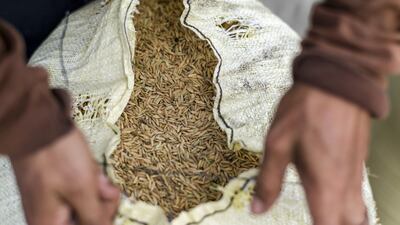The UAE has suspended the sale of rice overseas for four months with immediate effect.
The Ministry of Economy confirmed the temporary ban on the export and re-export of the food staple on Friday, state news agency Wam reported.
It said the decision also prohibited the export of rice originating from India that was imported after July 20.
This directive applies to all rice varieties covered by the unified customs tariff, which is “peeled rice, brown rice and fully or partially milled rice, whether it is smoothed or polished, and broken rice”, the ministry added.
Companies wishing to export or re-export these forms of rice must make a request to the ministry for an export permit.
Such dispensation must also be granted for the sale of rice originating outside of India. Permission for sales will be granted for 30 days under the ruling.
“The ministry indicated that this decision can be extended automatically, unless a decision is issued to cancel its implementation,” the Wam statement said.
Global shortage

The move comes one week after India, the world's leading rice exporter, imposed a ban on some overseas sales of the grain with immediate effect.
The decision was primarily aimed at non-basmati white rice exports, which account for about a quarter of the country's total rice exports.
The ban was put in place to ensure ample domestic supply and to combat rising prices in the local market.
Rice is a staple food for more than three billion people worldwide and demand is rising sharply.
Supply concerns has become a huge issue amid constraints linked to the Covid-19 pandemic, geopolitical tension such as the conflict in Ukraine, as well as the onset of the weather phenomenon, El Nino.
All these factors have significantly affected production.
India's ban came against the backdrop of international rice prices hitting their highest level in decades.
As the country contributes more than 40 per cent of all global rice shipments, the ban prompted concerns it could exacerbate food insecurity in countries highly reliant on imports of the grain.

